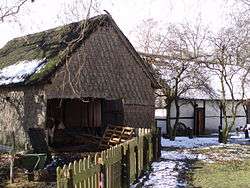Boô
A boô (also spelled boo or boe) ![]()

Etymology
The word boô is a cognate of the German word 'Bude' which means 'shack'.[1] The circumflex on the second 'o' indicates that a letter is left out. In Danish, 'bo' means house. The word boô is Low German.
History
A (usually unmarried) cattle farmer who spent time in a boô was called a boô-heer and was employed by a so-called "broodheer" (literally: bread lord). Once every fourteen days, the boô-heer would return to the farm for food supplies and clean clothes. He could keep the earnings of his only milk cow and the eggs his chickens laid.
The villages of Schoonebeek and Nieuw-Schoonebeek in the border area with Germany in the Dutch province of Drenthe are the only places where these buildings can be found. Because of this, Nieuw-Schoonebeek was known as Boôëndorf on the German side of the border. The boôs that can be found there today are replicas, which were not built in the original boôs' locations.
The last genuine boô, the Wilmsboô (owned by the Drents Historical Society De Spiker) in Nieuw Schoonebeek (1640) burnt down in October 2004.[2] The historical society suspected arson as the building had no gas or electricity.[3] In March 2005, a restoration programme was begun. Before it burned down, plans were afoot to have the original building listed on the European list of monuments.
Another replica, the Hekmansboô, is on the terrain of the dairy farm "De Katshaar" (not its original location) along the Europaweg (N863) in Schoonebeek.
References
| Wikimedia Commons has media related to Boô. |
- German-->English translation of "Bude" at odge.info. Note: 'Bude' is also used to refer to a someone's home in the abstract, as in 'my place'.
- "Laatste originele Drentse boo afgebrand" Archived 2011-07-24 at the Wayback Machine (Last original boo from Drenthe burnt down) from Nieuws.nl (published October 17, 2004; accessed September 6, 2006). (in Dutch)
- "Brand legt laatste Drentse boo in as" Archived September 27, 2007, at the Wayback Machine (Fire reduces last Drents boo to ashes) from the NBDC (published October 17, 2004; accessed September 6, 2006). (in Dutch)